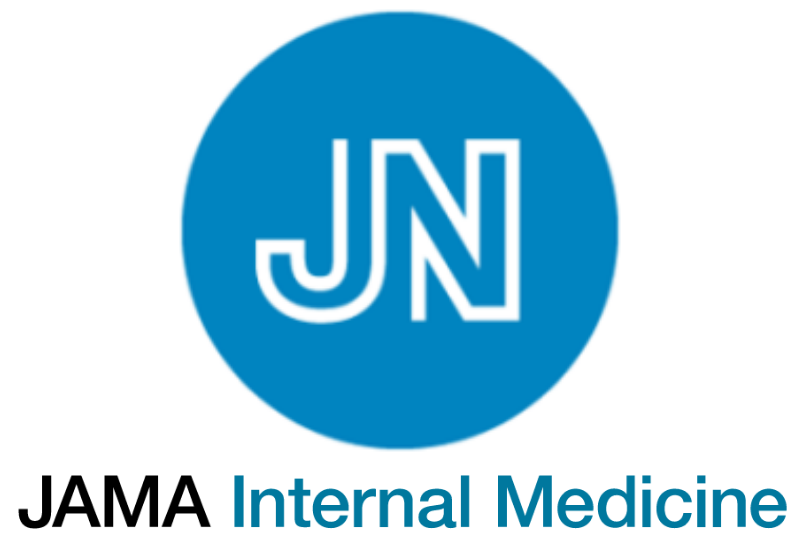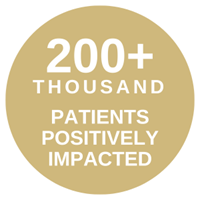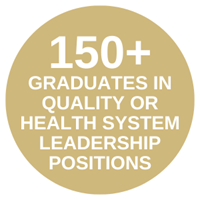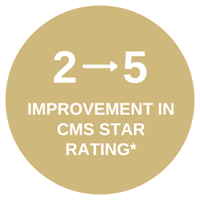
IMPROVING OUTCOMES
42% Reduction in Readmission Rate in Medical Patients
IMPROVING OUTCOMES
Reduced no-show rate from 37% to 16% amongst high-risk patients living with HIV.
CREATING THE SCIENCE
Handshake Stewardship Program becomes National Standard for Antimicrobial Stewardship Programs
The Joint Commission
IMPROVING OUTCOMES
48% Reduction in 1-year Mortality in Hip Fracture Patients
IMPROVING OUTCOMES
$2 Million Annual Reduction in Antibiotic Costs
IMPROVING OUTCOMES
$3 Million Annual Savings with Earlier Palliative Care Intervention
The mission of the Institute for Healthcare Quality, Safety & Efficiency is to create healthcare systems that ensure every patient receives the highest quality of care while avoiding harm, minimizing inefficiencies, and developing leaders in quality and safety.
Transformation, Not Just Education
At IHQSE our overarching goal is to fundamentally improve the care provided to patients by developing people, improving care processes and building higher-achieving organizations.
In other words, our goal is to transform:
to transform
INDIVIDUALS
We develop the capacity of frontline clinicians to drive change.
to transform
PROCESSES
We drive improvements in clinical care processes, leading to better outcomes.
to transform
ORGANIZATIONS
We help build higher-performing systems through sustained changes.
Results that Matter
Our formula for transformation combines expert training, intensive, tailored coaching, a deep catalog of successful projects to tap into, and a relentless drive for outcomes.





*IHQSE supported improvement at the University of Colorado Hospital
IHQSE Newsroom
For over a decade, our dedicated faculty have built an integrated set of programs aimed at developing programmatic leaders in quality, creating high-quality, safe and efficient clinical care processes and, ultimately, driving profound organization-level improvements. Here are just a few of our recent successes.
For more, please see our newsroom.

IHQSE faculty member, Dr. Katie Raffel, along with Dr. Katie Brooks and the UPSIDE research team, recently published findings from a multicenter retrospective cohort study evaluating the association between use of stigmatizing language and diagnostic error. The prevalence of stigmatizing language was higher among patients with diagnostic errors than those without. Use of this language was associated with delays in care at presentation and errors in communication with patients and caregivers. This raises the question of whether stigmatizing language may be indicative of clinician biases that interfere with data gathering, communication, and clinical reasoning.

Early lessons from the Utility of Predictive Systems in Diagnostic Errors (UPSIDE) study
May 21, 2023Diagnostic errors (DE) are a critical but understudied cause of preventable patient harm. While much work has focused on examining the incidence and factors contributing to DEs in ambulatory and emergency room settings, fewer studies have examined the incidence of DEs in hospitals or how they contribute to adverse events during the hospital encounter. IHQSE Faculty, Dr. Katie Raffel, along with other experts on diagnostic error, led an AHRQ-funded study at 31 US hospitals aimed at defining the prevalence and underlying causes of DEs in patients who die in the hospital or are transferred to the ICU after the first 48 hours.

IHQSE Team Develops Intervention to Reduce Unnecessary PT Consults
Dec 1, 2023Physical therapy (PT) in inpatient settings is a limited and valuable resource. Inappropriate PT consultation is costly and can lead to delays in care and discharge planning. A team of IHQSE alumni, including faculty members, Dr. Emily Gottenborg and Dr. Moksha Patel, dug into the root causes of unnecessary PT consultations and deployed an intervention that reduced the rate of inappropriate PT consults to less than 10%.

IHQSE Faculty Member Highlights Prevalence of Diagnostic Error in New Study
Jan 8, 2024Diagnostic error is common, morbid, and mortal. IHQSE faculty member, Dr. Katie Raffel, along with Dr. Andrew Auerbach and other experts on diagnostic error, recently published findings from a multicenter retrospective cohort study in which 2500 hospitalized adults who experienced ICU escalation or death were evaluated for diagnostic error. This study adds to a body of literature highlighting the importance of diagnostic safety within hospital medicine.